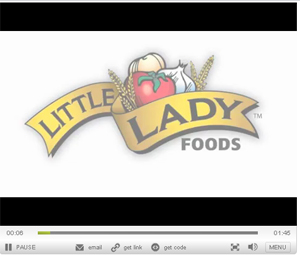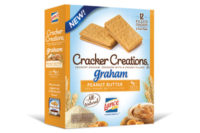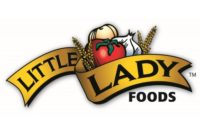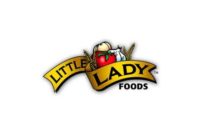
|
| Click on the image to watch the video about Little Lady Foods. |
There’s nothing little about Little Lady Foods, especially when it comes to the ability to manufacture frozen pizzas and sandwiches in big volumes for some of the biggest food customers around.
While its name may not be familiar or visible on a package or a menu, the Elk Grove Village, Ill.-based bakery is considered one of the top frozen pizza makers in the country. Quality and creativity go into everything it produces. Contract manufacturing for and nationally distributing products to top foodservice outlets, more than 20,000 restaurants and major retailers nationwide, Little Lady Foods has been partnering with category leaders for more than 25 years.
The company is all about customization. Its many services include contract packaging, recipe creation and modification, manufacturing, logistics, merchandising and much more. “We make everything easy for our customers and put customers first,” explains Peter Cokinos, senior vice president of sales and marketing. “Our culture is built around speed-to-market and innovation.”
Roughly 65% of the products Little Lady Foods produces, bakes and packages end up in supermarkets as either branded or private-label products. The other 35% of its volume goes to restaurants.
Restaurant roots
Little Lady Foods has certainly flourished from its days starting in 1961 when it was located in the Wrigleyville neighborhood of Chicago. In 1984, restaurateur Angelo Geocaris purchased the small company. The Geocaris family has deep roots in the restaurant industry, and he had the vision to take his locally popular Barnaby’s pizzeria recipes into grocery stores nationwide.
Angelo Geocaris kept the Little Lady Foods name when he took over. But he never could have imagined that the small bakery/food company with sales of $100,000 would grow into a Big Lady in 2012, featuring a multi-plant complex and nearly 800 employees, including about 430 full-timers, three production facilities and sales of more than $200 million annually.
Today, led jointly by Angelo’s sons Dan and John Geocaris, Little Lady Foods continues to listen to customers with all ears as it thrives. “We stay focused on the customer,” says John Geocaris, co-chief executive officer and chairman. “We provide innovation, creative problem-solving and consistent service, which helps attract and maintain long-term relationships with some of the country’s top food manufacturers.”
About a year ago, the company consolidated most employees into a larger, 20,000-sq.-ft. corporate complex across the street from its two production facilities in Elk Grove Village, freeing up needed space to expand plant operations.
No ‘one-size-fits-all’ philosophy
Nimble and flexible, the company is constantly re-inventing itself every day, knowing how much the frozen food business is evolving. It recognizes that creativity is important. Little Lady Foods’ value proposition includes the ability to customize products and supply-chain solutions, which are its main competitive advantage.
The level of customization is so high, in fact, that Little Lady Foods could be considered a company that runs as many as 20 businesses all in one, says co-CEO Dan Geocaris. “We really do run that many businesses when you think about it, because of our level of customization,” he says. “Some people have tried to put us into a one-size-fits-all, but it just doesn’t work. We have to accept that we’re running this type of operation and once that’s accepted, it makes things a little easier. It’s still extremely challenging, but it does get easier.”
The company produces about 100 stock-keeping units (SKU), including everything in frozen pizza from the premium and super-premium to the value-added. It also produces gourmet sandwiches for restaurants, foldover and hand-held sandwiches and flatbread items. The flavor combinations seem as endless as they do mouth-watering. “Sometimes we’re adding something, other times we’re eliminating,” says Cokinos. “The business is so flexible and we make so many pizzas, that it takes a lot of people and a lot of coordination all the time.”
Amazingly, the company can output nearly five million pizzas and three million sandwiches a week. The pizza products range from little 5-oz. snack items and deep-dish to 16-oz. family size versions. The retail items can be priced from $4.99 to $8.99 for a 12-in. pizza. Toppings and ingredients include everything from pineapple and Canadian bacon to Philly cheesesteak-type beef and cheese, Buffalo chicken/hot sauce creations and fire-roasted vegetables. Little Lady Foods also creates many better-for-you varieties of these products, such as low-carb, low-fat, high-fiber, organic and all-natural versions.
Varieties also fluctuate with the seasons and customer desires. “With everything that’s going on all the time, we really need to keep everything balanced,” Dan Geocaris adds. “One philosophy I have is if we don’t fight the fact that we may be running so many businesses at one time, we succeed.”
Listening to the customer and determining exactly how their entire operation works is key, adds John Geocaris. “We design products that work in customers’ kitchens, that are in the right master shipping case that fits into their freezers, that cook on the equipment they want it to cook on, that work with their back-end operations, so we try to plug all of this in; we don’t tell them they have to adjust to what we make. That’s why we give every customer a completely different solution, from product to packaging to supply chain.”
State-of-the-art technology
Busy Little Lady Foods also relies on state-of-the-art technologies to bake and freeze its products, using only the finest ingredients. The company enforces strict quality and safety standards to produce the highest quality products. The three plants are inspected by the U.S. Department of Agriculture and have received the American Institute of Baking (AIB)’s Superior rating each year since 1995. The plants have also received Level 3 of the Safe Quality Food (SQF) certification. They also incorporate metal detection in production areas and follow statistical process control (SPC) and Hazard Analysis Critical Control Points (HACCP) guidelines.
“We try to stay far ahead of the food safety regulations,” says Chris Celeslie, vice president of operations. “Having all of the national players as customers means that we’re audited by all of them and get rated very high. Our environmental pathogen controls—meaning the microbiology aspect of our business—are top notch. The SQF Level 3 certification at all three production locations is the highest level you can get.”
The two Elk Grove Village plants specialize in the frozen pizza products, and are located a few blocks from each other. One plant is outfitted with a culinary center for product development, recipe testing, quality control and customer collaboration. The culinary research and development team design new food creations to go with every customer’s business concept, fine-tuning recipes and helping to develop new ones. A third facility located in Gurnee, Ill., primarily produces hand-held frozen sandwiches, a major growth sector for the company.
All three plants operate two 10-hour shifts a day using a swing crew, explains Celeslie. “We run four 10-hour days, with three crews per line. The plants operate six days a week, but we alternate crews so that each crew works four days a week.”
Thus, employees are never bored at this custom food company. Three production lines generate pizzas at the plants in Elk Grove Village and four lines are in place at the Gurnee, Ill., facility. The Gurnee facility runs hand-held sandwiches, flatbread items and paninis on two lines there and pizzas on two more lines.
There’s a lot of pressure to ensure consistent quality, admits Dan Geocaris. “We’re the only company we know of in this kind of business with a Level 3 SQF certification in all three of our plants. We’re way below industry benchmark on customer complaints and we have to be below benchmark to justify these price points. Anyone spending $7 or $8 for a food product expects it to be perfect. If it’s not, it’s going to impact our relationships and our sales. So, it’s a challenge to get things right all the time, but for the most part, we do.”
Plenty to choose from
“We have a variety of dough-handling and mixing processes, a variety of ovens we can use and a variety of packaging,” adds Celeslie. “We also swap equipment out from one production line to another, depending on customer needs. We provide multiple locations available to make a product. Last year, we opened new corporate offices and added another production line in Elk Grove Village, so we’re upgrading things all the time.”
There’s so much flexibility that all of the lines are geared around providing just about everything, he says. “Take dough handling, for example. Traditional bakers use conventional sheeting processes or dough presses. We offer a combination of both. In our Gurnee facility, we’ve combined sheeting and pressing operation on one line.”
Says Cokinos: “Sheeting the dough gives the crust an open-cell structure, and it has more of a white bread quality that’s light and airy. Pressing the dough creates a tight skin like a tortilla or a taco, but we make it thicker. It’s much chewier and crispier.”
Customers also have their choice of different kinds of oven baking technology. The company has conventional wire mesh-conveyorized ovens and custom stone-fired ovens. “We can package pizzas for the retail and foodservice markets using modified atmosphere, flow-wrappers, shrink wrappers, you name it,” explains Celeslie. “Customers can choose packaging options based on what the front end match is, whether they want their pizza dough sheeted or pressed and whether they want stone-fired or conventional baking.”
The brick ovens are a main point of difference between Little Lady Foods and other frozen pizza manufacturers, Cokinos points out. “We’re able to produce so much heat from the brick, which obviously is the way products have been made for hundreds of years,” he says. “We get a completely different crust than we would with other baking methods out there. Our custom brick ovens are something we’re very proud of and have had for a number of years. They set our company apart.”
Customers love the products that come out of the brick ovens, he adds. “The texture of the crust is incredible. You see a completely different texture and color notes on the bottom of the product. It’s much crispier on the bottom and a bit chewier on the top than most. Customers like that texture.”
Along with specialty ovens and mobile stations on its production lines, where the company really hits a sweet spot with customers is its topping application, Celeslie adds. “There are ingredients that can be added to pizzas automatically using machines or they can be added to by hand,” he says. “We have automatic topping machines that are portable. In fact, all the topping stations are portable. We can slip in a piece of equipment or add a manual station, depending on what an order requires. We can add grilled, fire-roasted mixed vegetables by hand for example, and the next day we can slide that manual station out and put in automatic topping machines.”
While most food manufacturers and bakers would squirm over the choices customers have, Little Lady Foods is quite the opposite. As John Geocaris puts it, “Actually the more convoluted things get, the more we like it. Many food companies don’t want to get involved in the kinds of customization we do. We work in a world where others ask, ‘Tell me what you want and we’ll make it inexpensively.’ We’d say something more like, ‘Tell me what you’re interested in and we’ll come up with something you haven’t seen before.’”
Lasting relationships
Perhaps it’s for that reason that despite the economic concerns these days, and a climate where suppliers are frequently changed, Little Lady Foods continues to garner the loyalty and support of major retailers and foodservice customers.
Building relationships and its reputation as a trusted supplier with customer partners for 10 or more years, Little Lady Foods is dedicated to providing authentic customization and creating and delivering products that satisfy both operational and consumer demands, says Cokinos. “Every employee understands the mandate to place ourselves in our customers’ shoes and I believe it’s for this reason that we have maintained such strong and lasting relationships with customers.”
Dan Geocaris says he’s most proud of the fact that half of the customers have been loyal for more than 10 years. “You just don’t see that very much any more,” he points out. “There’s great loyalty and trust there. We have had one customer for 21 years that just gives us a handshake. We have very good relationships that have withstood the test of time.”
Distinctive advantages
He points to another key factor that makes Little Lady Foods distinctive: “We don’t have our own brands,” he says “A brand could get in the way of things and could be counter-productive. Our customers really like the fact that we don’t have our own brand. We’re never going to compete with our customers. Our customers are our brands. We do a very good job of making sure they understand that and they appreciate it. I think it’s a huge point of difference for us.”
Little Lady Foods is also unique because it serves three different areas of business: Foodservice; contract packaging; and branded products. “What keeps things exciting is that we’re the only company involved in these three areas,” says Dan Geocaris. “There’s always activity in at least one of the three and we play very aggressively and successfully in all three. So we’re always having a lot to do in any area.”
Another point of difference? The company is nimble but can do many things on a large scale. “That’s not easy,” he admits. “Customers don’t want to get more involved in production—they want to be less involved. Private-label’s becoming more innovative and then foodservice creates a lot of limited-time offers, which can extend into long-range projects, so they’re looking for innovative things to get in and out of stores quickly. That plays to our strengths, especially on the scale we have.”
Be it artisan, better-for-you, portability, multigrain, smaller portions, snack-size pizzas and flavored crusts, the company watches all of the trends and suggests different things to incorporate in products to accommodate every customer need.
Will Little Lady Foods continue to expand and get any bigger? Customers will certainly be involved if it does or if it adds another production facility, Cokinos observes. “We’re very fortunate that we’re in the best spot—the middle of the country—to best do business on a national level,” he points out. “We’ve been growing again recently, we employ a lot of people and we have new office space. The renovations we’ve been doing to the plants has been fun.”
In terms of distribution, we’re in a good position, he continues. “If we were to expand again, it would probably depend on what our customers’ needs are,” he says. “We bought our second plant in Elk Grove Village in 1999 because a customer was growing by double digits and wanted to get into a particular piece of business. We opened the Gurnee facility in 2002 for another customer that decided to grow with us. And we’ll continue to evaluate any further expansions and see if it would make sense.”
On the horizon
What’s next for this highly motivated, dynamic food company? It will continue to work with high-profile chefs. Already, Little Lady Foods produces a line of premium gourmet Mexican pizzas bearing the name of celebrity chef Rick Bayless, and plans to work with another “very high-profile chef” in the next few months, Dan Geocaris points out. “We’ve had a ton of success with breakfast sandwiches and will be looking to develop that market further,” he says. “The hand-held sandwich is a big part of our company and we will continue to see a lot of growth in that area.”
Little Lady Foods has much to be proud of, with all of the lasting relationships, partnerships and long-term employees it has cultivated, explains John Geocaris. “I think I’m the most proud of the fact that we’ve gone from five employees when we started to what we are today. It’s also very nice to come up with a product, see it go into the market and see how much people like it. To me, that’s really satisfying.”






